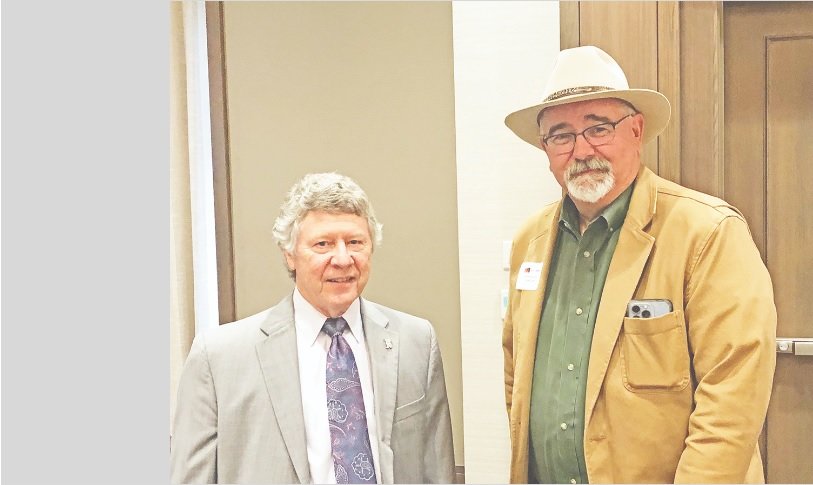Former county judge provides insights on local infrastructure
If the U.S. interstate highway system were to be built today, how and where would it be built? Former Harris County Judge Ed Emmett shared his thoughts about these questions, and perspectives on infrastructure in Harris County, Thursday.
This item is available in full to subscribers.
Attention subscribers
To continue reading, you will need to either log in to your subscriber account, or purchase a new subscription.
If you are a current print subscriber, you can set up a free website account and connect your subscription to it by clicking here.
If you are a digital subscriber with an active, online-only subscription then you already have an account here. Just reset your password if you've not yet logged in to your account on this new site.
Otherwise, click here to view your options for subscribing.
Please log in to continue |
Former county judge provides insights on local infrastructure
If the U.S. interstate highway system were to be built today, how and where would it be built? Former Harris County Judge Ed Emmett shared his thoughts about these questions, and perspectives on infrastructure in Harris County, Thursday.
Emmett today is a fellow in energy and transportation policy at the Baker Institute at Rice University. He spoke at an infrastructure summit held at the Embassy Suites, 16435 Katy Fwy. The Katy Area Chamber of Commerce hosted the event.
“Interstate highways are old, and for people like me that’s a problem because I remember when they were being built and towns fought over which ones got the interstate highways and which ones didn’t,” Emmett said. “Everybody wanted them. They increased mobility. They made everybody’s lives better. If you go back and look at the economic boom that occurred in the United States, I don’t think it’s a stretch to say that the interstate highway system contributed more than anything else to that boom.”
On where and how highways would be built today, Emmett shared a quote out of the New York Times that said highway expansions increase traffic and pollution.
“Do they really increase traffic or do they accommodate the traffic?” Emmett asked. “And do they increase pollution or do they actually cut down on it because you don’t have all those cars stuck and spewing things out the exhaust pipe.”
Emmett said there is a new theory, espoused even by some of his colleagues at the Baker Institute, that says some of the most dangerous pollution comes out of tires, not out of the exhaust pipe.
“You never think about that,” Emmett said. “But particulates and all that is the tires wearing out. Anyway, that’s something else to think about.”
Emmett described another article as saying that an infrastructure bill could address past harms to black and low-income neighborhoods caused by the interstate system.
“That’s what got me interested,” Emmett said. “Then we put together a research project at Baker because if you’re going to rebuild the interstate highway system, you have to go back and look at why was it built, where was it built in the first place. And now we live in a mobile culture where everybody’s going back and making judgments of what’s happened decades ago based on today’s values.”
Emmett said he didn’t know who made the decisions at the time, but somebody said that the interstate highways were all going to go into downtowns.
“Does that make sense really?” Emmett asked. “Not necessarily. I’m not sure I want to go to downtown. But the promoters in various cities said their goal they’ve got to go in to downtown. Why? Commuters, I assume. But then what’s the first thing they did when they actually made them into downtown. They built loops so you didn’t have to go to downtown.”
Emmett said if one were to build anything in the 1950s and 1960s into a downtown area, that construction would likely go through minority neighborhoods that ring the downtowns because that’s where people of color lived then. That had an effect, Emmett said.
“There’s no point in saying no, it didn’t destroy the neighborhoods because frankly, it did,” Emmett said. “But was it the intent? I think not, but we’re going to go back and try to figure that out.”
Building highways often means relocating longtime residents.
“There’s going to be headwind and there’s also a big movement of, frankly, to not build any more highways,” Emmett said, quoting but not naming a present Harris County Commissioners Court member who, he said, felt “we should build highways for people, not cars.”
Emmett said the last time he checked, cars all had people in them.
“Even autonomous vehicles are going to have people,” Emmett said. “That’s the whole purpose. But it also ignores freight, but underlying is a belief and you can decide if it’s right or wrong. The belief is that if we just don’t build highways, then people will move back into town and we will restore urbanism is the way it should be in their point of view.”
Emmett said the flaw with that view is that people moved out of the inner city for schools. Another reason, he said, was more property. He said the COVID pandemic will affect the situation because more people are working from home and the downtown office buildings aren’t filling up as they had previously.
Keywords
highways, infrastructure, Katy Area Chamber of Commerce






